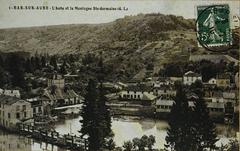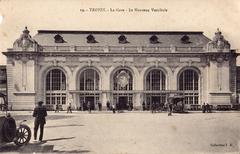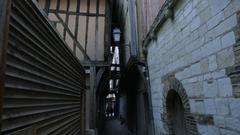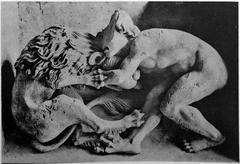Pharmacy Museum of the Hôtel-Dieu Troyes: Visiting Hours, Tickets, and History
Date: 14/06/2025
Introduction
Located in the heart of Troyes, France, the Pharmacy Museum of the Hôtel-Dieu-le-Comte offers a captivating exploration of pharmacy’s evolution from the Middle Ages to the 20th century. Set within the historic Hôtel-Dieu, founded in the 12th century, the museum preserves an authentic 18th-century apothecary, complete with Louis XIV-style oak paneling, monumental rolling ladders, and an extensive collection of pharmaceutical artifacts. This guide provides comprehensive insights into the museum’s history, collections, visiting information, educational features, and practical tips for making the most of your visit.
(cite-vitrail.fr; museesgrandest.org; en.troyeslachampagne.com; petitfute.com)
Historical Background
The Hôtel-Dieu-le-Comte was established in the mid-12th century by Henri I, Count of Champagne, as a charitable hospital serving Troyes’ sick and needy. The original structure gave way to a more robust stone building in the late 17th century, reflecting the era’s architectural ambitions (pop.culture.gouv.fr). By 1725, the apothecary (apothicairerie) was established, featuring a grand hall and an adjacent laboratory where remedies were prepared by apothecaries and religious sisters.
The apothecary remained operational until the early 1960s, one of the last of its kind in France to do so. In 1976, the site became a museum and was designated a “Musée de France,” underscoring its national importance and commitment to cultural preservation (museesgrandest.org).
Collections and Architectural Heritage
Apothecary Room and Laboratory
The museum’s centerpiece is the beautifully preserved apothecary room, with nearly 5-meter-high oak paneling, a monumental rolling ladder, and original cabinetry. The laboratory, notable for its ribbed vault and 19th-century mosaic floor, is equipped with historical furnaces, copper vessels, balances, and a wooden press (cite-vitrail.fr).
Unique Artifacts
- Painted Wooden Boxes: 319 silènes, inspired by Pierre Pomet’s “Histoire générale des drogues” (1694-95), each labeled and decorated, highlight Enlightenment artistry and pharmaceutical science.
- Ceramic Jars: Nearly 250 pieces from the 16th to 18th centuries, along with bronze mortars and a large pewter theriac fountain.
- Religious Relics: Reliquary busts and chests, reflecting the hospital’s religious and social mission.
- Laboratory Instruments: Balances, alambics, and original pharmaceutical tools, offering insight into remedy preparation and conservation (pop.culture.gouv.fr).
Educational and Interactive Features
Modern digital tablets guide visitors through ingredient histories and ancient recipes, while games and workshops engage children and families. Activities such as “Apothicaire et Charlatan,” scent workshops, and the “budding apothecary” area offer hands-on educational experiences, making the museum accessible and enjoyable for all ages (museesgrandest.org).
Visiting Information
Location
- Address: 31 Quai des Comtes de Champagne / 15 Rue de la Cité, 10000 Troyes, France
- Nearby: Troyes Cathedral, Cité du Vitrail, Musée Saint-Loup, and other historic sites.
Opening Hours
- April–October: Tuesday to Sunday, 10:00–13:00 and 14:00–18:00
- November–March: Tuesday to Sunday, 10:00–13:00 and 14:00–17:00
- Closed: Mondays and public holidays (petitfute.com)
Admission
- Standard Entry: €5–€6 per adult
- Discounts: €4 for students, seniors; children under 12 (or under 26, depending on the offer) enter free
- Free Days: First Sunday of each month (all visitors); first Saturday of each month for Troyens with Pass’Troyen; other exemptions granted with proof (whichmuseum.com)
Tickets
Tickets can be purchased at the museum or online via the official tourism website.
Guided Tours
- Availability: Regularly in French; English tours available by prior arrangement for groups.
- Special Events: The museum hosts workshops and temporary exhibitions; check the museum agenda for updates.
Accessibility
- Wheelchair Access: Some ramps and elevators; call ahead for specific needs. Note that the historic nature of the building may pose challenges in certain areas.
- Parking: Free and paid options nearby; accessible spaces available with advance notice (Troyes Parc Auto).
- Facilities: Restrooms and gardens on-site; no café, but dining options are available nearby.
Practical Tips and Travel Advice
- Language: Most displays are in French. Consider a translation app or printed guide if needed.
- Photography: Permitted without flash; always check with staff for any restrictions.
- Time Required: Plan for 1–2 hours to fully explore the museum and nearby sites.
- Combine Your Visit: Pair your visit with the Cité du Vitrail, Troyes Cathedral, or the Musée d’Art Moderne for a full day of cultural discovery.
Visitor Experience: Strengths and Feedback
What Visitors Appreciate
- Authenticity: The meticulously preserved interiors and artifacts create a uniquely immersive atmosphere.
- Knowledgeable Guides: Guided tours receive high praise for their depth and engaging delivery.
- Interactive Learning: Hands-on activities and digital tools make the museum accessible for all ages.
Challenges Mentioned
- Limited English Materials: Some international visitors find the lack of English signage and tours challenging.
- Accessibility: The historic building’s layout may present mobility issues.
- Unpredictable Hours: Occasional closures for restoration; always verify opening hours before arrival.
Frequently Asked Questions (FAQ)
Q: What are the museum’s opening hours?
A: Tuesday to Sunday, 10:00–18:00 (April–October); 10:00–17:00 (November–March); closed Mondays and holidays.
Q: How much are tickets?
A: Adults €5–€6, discounts for students/seniors, free for children under 12 or 26 (with valid ID), and various exemptions.
Q: Are tours available in English?
A: Regular tours in French; English tours by advance request for groups.
Q: Is the museum accessible for people with reduced mobility?
A: Some areas are accessible; call in advance for details.
Q: Can I take photographs?
A: Yes, non-flash photography is generally allowed.
Contact and Further Information
- Official Website: cite-vitrail.fr
- Tourism Office: en.troyeslachampagne.com
- Event Listings: agendaculturel.fr
- Practical Details: whichmuseum.com
- France-Voyage Guide: France-Voyage
Conclusion
The Pharmacy Museum of the Hôtel-Dieu-le-Comte in Troyes is a rare and enriching destination for history, science, and art enthusiasts. Its authentic 18th-century apothecary, exceptional pharmaceutical collections, and engaging educational features make it a highlight among Troyes’ cultural sites. To make the most of your visit, check current hours, book a guided tour if desired, and consider exploring nearby attractions. Enhance your experience by downloading the Audiala app for audio guides and staying connected via social media for updates and special events.
Summary
The Pharmacy Museum of the Hôtel-Dieu-le-Comte offers a vivid journey through centuries of healthcare and pharmacy, combining meticulously preserved interiors, significant collections, and interactive educational programming. Its location in Troyes’ historic center makes it easily accessible, while ongoing efforts continue to enhance accessibility and visitor engagement. Plan ahead, consult official resources, and enjoy this unique testament to medical and cultural history in France.
Sources
- Visiting the Pharmacy Museum of the Hôtel-Dieu in Troyes: Hours, Tickets, History, and Highlights, 2024, cite-vitrail.fr (https://cite-vitrail.fr/fr/decouvrez-la-cite/apothicairerie)
- Pharmacy Museum Hôtel-Dieu-le-Comte in Troyes: Visiting Hours, Tickets, Collections & Historical Significance, 2024, museesgrandest.org (https://www.museesgrandest.org/les-musees/apothicairerie-de-lhotel-dieu-le-comte/)
- Visitor Information and Practical Tips, 2024, whichmuseum.com (https://whichmuseum.com/museum/hotel-dieu-le-comte-troyes-38901)
- Visiting the Pharmacy Museum of Hôtel-Dieu Troyes: Hours, Tickets, and Historical Insights, 2024, France-Voyage (https://www.france-voyage.com/cities-towns/troyes-412/museum-pharmacie-hotel-dieu-5722.htm)
- En Troyes La Champagne, 2024, en.troyeslachampagne.com (https://en.troyeslachampagne.com/cultural-heritage/apothicairerie-de-lhotel-dieu-le-comte/)
- Petit Futé, 2024, petitfute.com (https://www.petitfute.com/v12326-troyes-10000/c1173-visites-points-d-interet/c958-musee/106628-apothicairerie-de-l-hotel-dieu.html)
- Pop Culture Government Portal, 2024, pop.culture.gouv.fr (https://pop.culture.gouv.fr/notice/museo/M0305)




